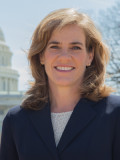 By General Counsel K. Hollyn Hollman
By General Counsel K. Hollyn Hollman
It takes more than a sentence or two to explain the factual background of Zubik v. Burwell, the current religious liberty case pending before the U.S. Supreme Court. The case is the latest development in a long-unfolding story about the Affordable Care Act’s contraceptive mandate, its application to religious entities, and the meaning of the federal Religious Freedom Restoration Act of 1993 (RFRA). The Affordable Care Act in general, and contraceptives in particular, are important matters that warrant serious debate. It may be unfortunate, but it’s not surprising in our current climate, that this case inspires a lot of emotion and political rancor.
By filing an amicus brief in Zubik, the BJC weighed in on the issues that we believe are most essential for continuing protection of religious liberty for all. In a brief authored by Professor Douglas Laycock, we defend the sufficiency of the religious liberty exemptions at issue in the case and respond to far-reaching arguments made by three dozen petitioners — including individuals, religious charities and Christian colleges — that we believe endanger religious liberty.
As noted at the outset of the brief, the BJC and Professor Laycock have worked for more than 25 years – often together – to enact, implement and defend RFRA. That law creates a unique balancing test between substantial burdens on religion and the compelling interests of the government. While the kinds of claims being pursued under RFRA (and RFRA’s state counterparts) may have become more controversial, the standard is sound and continues to provide a measure of protection fitting for a country that prizes religious liberty as its first freedom.
While it is much more common for the BJC and Professor Laycock to be pushing against government action that does not adequately protect religious liberty, the brief in this case reminds the Court and other readers that “religious liberty can be endangered by exaggerated claims and overreaching as well as by government intransigence and judicial under enforcement.” In Zubik, religiously affiliated nonprofits use RFRA to challenge the government’s accommodation procedure designed to allow them to avoid contracting, arranging, paying, or even referring for contraception. The government has provided a careful system of exemptions that responds to religious objections about contraception without depriving thousands of employees important health care benefits. This is the win-win solution the Court pointed to in the Hobby Lobby case.
The brief argues that the exemption procedure for the petitioners (called the “accommodation”), which requires written notification of a religious objection, does not amount to a substantial burden on the exercise of religion. The organizations have been wholly exempted from providing contraception themselves, and the objection is to the government’s efforts to deliver contraception separately through secular insurers, with segregated funds and segregated communications.
While deference should be given to religious understandings, the brief explains that absolute deference produces its own problems and “would produce absurd results that would discredit the cause of religious liberty.” The Zubik petitioners’ arguments illustrate the point. Their claims have moved fluidly as they articulated the exercise of religion burdened by the government. They first objected to providing contraceptive coverage, then to the accommodation form, then to providing contact information for their insurance company, and finally to maintaining contractual relationships with insurance companies that provide the employee benefits. While petitioners may have sincerely held beliefs against performing such acts, the brief explains that “substantial to the believer is not inevitably the same as substantial in law.”
Additionally, the BJC’s brief defends the practice of legislative and administrative exemptions, which are typical means of ensuring religious liberty while protecting other important government interests. The government must be able to draw reasonable lines when it creates religious exemptions, which exist in local, state and federal law. “If legislatures and administrative agencies cannot enact a narrow religious exemption without it being turned into a much broader religious exemption, many of them will not enact any religious exemptions at all, and many existing religious exemptions will be repealed,” according to the brief.
Despite what petitioners argue, legislative and administrative exemptions designed to protect religious liberty without harming other important interests should be encouraged, not threatened with “all or nothing” demands. In short, the religious organizations have been relieved of paying for or appearing to approve of objectionable services. Their RFRA claims, however, cannot extend to the government’s regulation of secular insurers.
From the March 2016 edition of Report from the Capital. Click here to view the issue as a PDF document.





